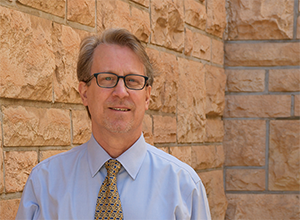UW Law Professor Credited with Reshaping Legal Writing Field
Published January 16, 2024

The Association of Legal Writing Directors (ALWD) recently celebrated the 20th anniversary of its groundbreaking journal and recognized Professor Michael R. Smith as a prime architect of its creation.
In 2002, Smith was tapped by ALWD to become a co-founder of the organization’s new journal and to craft a mission to elevate the scholarship and discipline of legal writing.
“At the time, most publications by legal writing professionals were either anecdotal ‘how to’ articles on legal writing or articles on how to teach legal writing,” says Smith. “Very little research-based scholarship was being written on the substantive nature of effective legal writing.”
The first volume of the Journal of the Association of Legal Writing Directors (J.ALWD) was published in 2004. According to Smith’s design, it created a forum for empirical and interdisciplinary scholarship on legal writing, legal analysis, and written legal advocacy.
In the lead article of the first volume, Smith introduced three bedrock principles for the journal. As he writes in the 20th anniversary issue, “The Journal is dedicated to encouraging and publishing scholarship
-
focusing on the substance of legal writing,
-
grounded in legal doctrine, empirical research, or interdisciplinary theory; and
-
accessible and helpful to all ‘doers’ of legal writing: attorneys, judges, law students, and legal academicians.”
“We thought of the founding of the journal as a political act,” says Linda Berger, professor of law emerita at the William S. Boyd School of Law at the University of Nevada, Las Vegas. She was a co-founder with Smith and the journal’s editor-in-chief from 2002 to 2009.
“Michael [was asked to participate because he] had been banging the drums for what he called scholarship focusing on the substance of legal writing,” she says in an interview published in the anniversary issue. “Michael is, I think, primarily responsible for the specific details of the journal’s mission that emerged.”
Asked which articles published over the years have contributed most to the discipline and the profession of legal writing, Berger says, “My first influential article, I think is—I hate to say the word no-brainer—but this has to be a no-brainer. It’s Michael Smith[‘s lead article], The Next Frontier: Exploring the Substance of Legal Writing.”
Past editor-in-chief Ruth Anne Robbins echoes Berger. “Michael’s piece [in the first J.ALWD volume] absolutely set the stage. So, I have to join Linda’s nomination.”
Putting its mission into action, the journal, now called Communication and Rhetoric: JALWD, has published articles over the last 20 years that explore effective legal writing from the standpoints of other disciplines, including cognitive science, classical and contemporary rhetoric, linguistics, narrative theory and applied storytelling, typography and document design, music theory, psycholinguistics, and electronic communications theory.
Smith has taught and written about legal writing for 34 years. Since 2006, he has built a nationally recognized legal writing program at the University of Wyoming College of Law and is the founder and director of the College’s Center for the Study of Written Advocacy. In 2010, Smith was awarded a special recognition by the J.ALWD editorial board “for envisioning the ‘next frontier’ of legal writing scholarship and exploring it with us.”
Smith earned his J.D. at the University of Florida and practiced law in Florida and California before finding his calling in legal writing. His latest article is JALWD: Twenty Years of Exploring New Frontiers in Legal Writing Doctrine, 20 LEGAL COMM. & RHETORIC 19 (2023).

